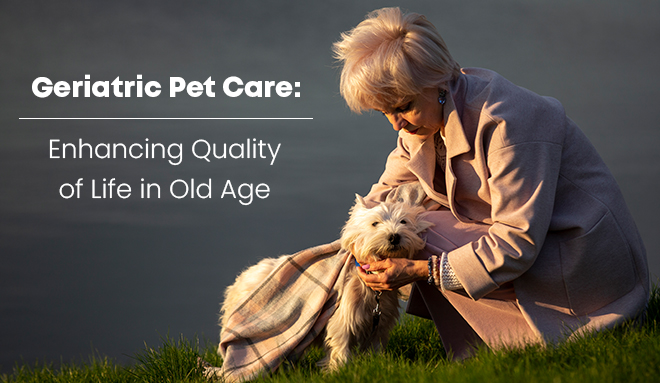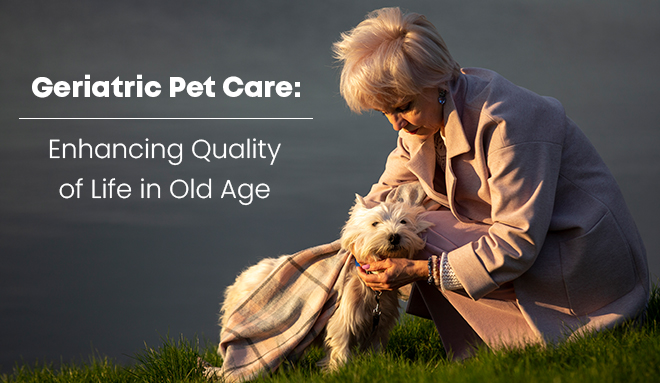
Our pets are an integral part of our lives, providing us with joy and companionship. As we age, our pets may require additional care and attention in order to ensure they live a long and fulfilling life. This blog will explore the world of Geriatric Pet Care and learn about strategies to improve the quality of life of elderly pets. We will focus on key aspects of care, such as nutrition and grooming, to ensure that our pets are comfortable and happy as they age.
Understanding Geriatric Pet Care
Geriatric Pet Care is a specialised field of pet wellness that focuses on the specific needs of aging pets. It is important to be aware of the changes that occur in our pets’ bodies as they age and to adjust their routine accordingly.
- Elderly Pet Health
As pets age, they may encounter various health issues, including arthritis, cognitive dysfunction, and dental problems. Regular veterinary check-ups become increasingly important during their senior years to ensure their health and happiness. A proactive approach to health management can help detect and address potential issues before they become severe.
Regular wellness examinations for senior pets are recommended, as they can assist your veterinarian in identifying age-related health concerns early on. Furthermore, maintaining open communication with your vet and discussing any behavioural or physical changes in your pet is crucial for their well-being.
- Senior Pet Nutrition
Nutrition is obviously one of the major aspects when it comes to enhancing the quality of life for geriatric pets. As pets age, their dietary requirements change, and you may need to modify their diet to accommodate these changes. It’s important to provide your senior pet with a well-balanced diet that suits their specific needs.
Older pets may require diets that are lower in calories to prevent weight gain and reduce the risk of obesity, which can exacerbate joint problems. Specialised senior pet food is available in the market, formulated to support aging pets with ingredients that promote joint health, cognitive function, and dental care. Always consult with your veterinarian to determine the best diet for your elderly pet based on their individual needs.
- Senior Pet Grooming
Grooming is not only about keeping your pet looking their best but also about maintaining their health and comfort. For senior pets, grooming can become more challenging due to mobility issues or changes in skin and coat health. Regular grooming sessions can help address these challenges and contribute to your pet’s quality of life.
Brushing your pet’s coat helps prevent matting and reduces skin irritations. In addition, it’s essential to pay attention to their nails and keep them trimmed, as older pets may be less active and naturally wear down their nails less. Regular ear cleaning, dental care, and skin checks are also crucial components of senior pet grooming.
Practical Tips for Enhancing Your Senior Pet’s Quality of Life
In addition to addressing the specific needs of geriatric pets, several practical tips can make a significant difference in enhancing their quality of life:
- Make your home senior-pet-friendly by providing soft bedding, ramps, or stairs to help them access elevated areas, and non-slip surfaces to prevent accidents. Put in simple terms, pay attention to offering a comfortable home for your geriatric pet.
- See to it that you do not neglect the importance of regular exercise. While senior pets may not be as active as their younger counterparts, they still need exercise to maintain mobility and mental stimulation. Short, gentle walks and interactive playtime can help keep them active.
- Mental stimulation is just as important in old age as it used to be in their early lives. Engage your pet’s mind with puzzle toys and interactive games to combat cognitive decline and keep them mentally sharp.
- If your pet requires parasitic treatments, make sure you administer them as prescribed and keep up with refills to manage chronic conditions effectively.
- Give your senior pet plenty of love, attention, and companionship. They thrive on your presence, and it can help alleviate anxiety and depression.
Geriatric pet care is a labour of love, a testament to the strong bonds we share with our pets. As our furry friends age, their needs evolve, and it’s our responsibility to ensure they age with dignity and comfort. By focusing on their health, nutrition, grooming, and overall well-being, we can enhance the quality of life for our senior pets. They may have a few more grey hairs, but their capacity to bring joy into our lives remains as vibrant as ever.


